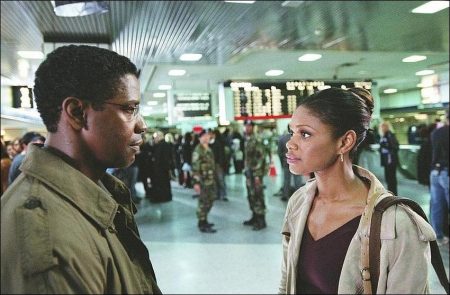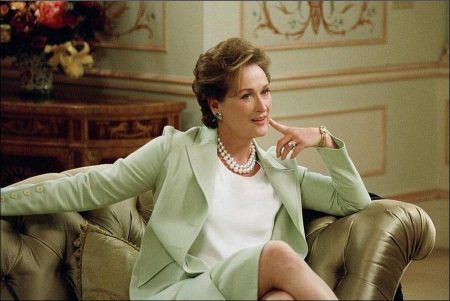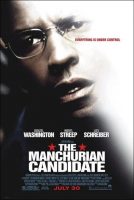The Manchurian Candidate Movie Trailer. Director Jonathan Demme and star Denzel Washington team together for the first time since 1993’s critically acclaimed “Philadelphia” in this remake of the 1962 political thriller “The Manchurian Candidate,” which was based on the novel of the same name by Richard Condon and featured Frank Sinatra in the lead role.
Washington plays Bennett Marco, a soldier who, along with Raymond Shaw (Liev Schreiber) and the rest of their platoon, is kidnapped by the enemy during the first Gulf War. Back home years later, as Shaw rises to political prominence, Marco begins to remember that they had been brainwashed by their captors, programmed to carry out the wishes of terrorists when triggered by a specific phrase. “The Manchurian Candidate” also stars Meryl Streep, Miguel Ferrer, and Jon Voight.
Crammed with enough creepy contemporary vibes to keep conspiracy theorists occupied through the November election, Jonathan Demme’s new take on “The Manchurian Candidate” absorbingly and sometimes mesmerizingly validates the initially questionable idea of remaking one of the certified classics of the ’60s. Structurally and thematically similar to John Frankenheimer’s original but entirely different in style, feel and nuance, this political thriller about a brainwashed soldier being positioned for the White House provides a delectable network of dramatic tripwires that teases the mind and quickens the pulse.
This is brainy popcorn fare that, given its outstanding cast and exploitably relevant content, should play well with all audiences through the summer and beyond, even if a couple of commercial doubts linger; the original, despite wide acclaim, disappointed on initial release, and it’s possible the story’s real-life implications may cut too close to the bone.
Despite its basis in the Richard Condon novel and George Axelrod script that drove the 1962 film, Demme’s picture, with its ambiguous mood and unsettling tension, also recalls Alan J. Pakula’s shadow-world suspensers of the ’70s: “Klute,” “The Parallax View” and “All the President’s Men.”
By outfitting the superbly insinuating basic story with a battery of up-to-the-minute concerns that readily feed on present fears and suspicions, Demme and screenwriters Daniel Pyne and Dean Georgaris inject new life into a recently dormant genre — the paranoid thriller — that talented filmmakers might do well to revisit more regularly.
After making his biggest career stumble last year with “The Truth About Charlie” (a remake of another cherished ’60s title, “Charade”), Demme has bounced back with a picture that, in unexpected ways, stands as a companion piece to “The Silence of the Lambs.” Both films, in the end, are about mind control and manipulation, about the diverse ways that evil can be instilled in well-intended people. The two works bore deeply into the heads — literally, in this case — of their central characters, to scary effect in both instances.
Both “Candidates” begin on the battlefield, in wars set about a decade prior to their making; then it was Korea; now it’s the Gulf War. In a quick flash of nocturnal action, a platoon led by Army Capt. Bennett Marco (Denzel Washington) is attacked in Iraqi-held territory in Kuwait. In the confusion, it appears most of the crew is saved by the heroics of Sgt. Raymond Shaw (Liev Schreiber). Shaw is given the Medal of Honor, and Marco long after extols the bravery of his comrade-in-arms.
A dozen or so years later, however, the men’s positions have significantly changed. Marco is now a Major, serving in Washington, D.C. In one of the biggest story changes from the original, Shaw is a two-term congressman from New York whose doting, whim-of-steel mother Eleanor (Meryl Streep), herself a senator, contrives to maneuver onto the ticket as her party’s vice-presidential candidate, at the expense of the original favorite, veteran old-style liberal senator Thomas Jordan (Jon Voight).
Marco suddenly receives a surprise visit from a member of the old platoon, Melvin (Jeffrey Wright), a disturbed man afflicted with dreadful dreams reflected in his gruesome drawings. This triggers a weird flashback in Marco of him and his fellow soldiers hooked up to strange equipment in some sort of lab during the war, a vision echoed by a modern scene in which Shaw enters a secret room to have a tiny implant installed in his brain by a smoothly sinister doctor (Simon McBurney) familiar from Marco’s dream.
In terms of dramatic trajectory, this new “Candidate” wisely retains Axelrod’s immaculate construction while reconceiving the nature of individual scenes and source of the overriding evil. The “Manchurian” element in the original referred to the region of China and the communists’ brainwashing of American soldiers; here, in typical post-’60s conspiracy theory style, the enemy lies within, specifically with a huge corporation called Manchurian Global (read Halliburton) that specializes in servicing the military.
So instead of Frankenheimer’s surreal gatherings of Red operatives and proper society ladies where Yank G.I.s murder their buddies on command, Demme offers a not-implausible world where a splinter-sized implant can not only alter a subject’s emotions, but unconsciously force them to do another’s bidding. Such is Manchurian’s intent once Shaw is in place a heartbeat from the presidency. Rebuffed by his old friend Shaw and instructed by the Army to get help for what it insists is Gulf War Syndrome, Marco keeps puzzling over the macabre visions sketched by Melvin, who soon turns up dead.
On a train to New York, Marco is picked up by the friendly Rosie, and he finally gets to sit down with Shaw, whose normal impervious demeanor breaks down in an erratic confessional in which he both reveals his resentment over his mother’s domination and expresses his disdain for the “little people” his party is supposed to represent.
Although there’s no question which side of ideological spectrum Demme and his collaborators represent, they have scrambled the political cross-currents in ways that energize the picture and provocatively mess with viewers’ expectations. Although it’s not identified, the out-of-power party to which Shaw and his mother Ellie belong is clearly meant to the Democrats. All the same, Ellie (a role brilliantly originated by Angela Lansbury) is a hard-line militaristic patriot who depises wimpy liberalism and is in deep with Manchurian. Add to that the unmistakable impression that Streep, in her riveting portrait of unbridled ambition and a bulldozer negotiating style, is channeling Hillary Clinton, and you have one thorny thicket of allegiances to pick through. Further unease is created by crucial scenes that take place at the party convention and on election day.
Soundtrack is laced with background references to U.S. military incursions in such places as Indonesia and Guinea as well as incidents of domestic violence. As the action pushes relentlessly toward the climax, which like the original takes place at a huge political rally with an assassin lurking in the rafters, the layers of conspiracy and questions about how far the complicity extends have been pushed to their limits by scripters who have added character twists that impact decisively on the ending.
With his usual lenser Tak Fujimoto emphasizing close-ups, and some well-judged image altering punching up key moments from time to time, Demme has delivered a visually arresting picture further fleshed out by a dense sound mix and an unobtrusively supportive score by Rachel Portman, with help from Wyclef Jean, whose version of John Fogerty’s “Fortunate Son” over the end credits is a grabber. As he proved in “The Silence of the Lambs” and elsewhere, Demme knows how to serve up the genre goods on a bed of rich cultural trappings flavored by spicy political smarts.
Playing another ambiguous hero saddled with doubts and emotional vacuums, Washington, in the role Frank Sinatra originated, provides this often vertiginous story with a strong center of gravity in a skillful performance that necessitates juggling the character’s fundamental reliability and frequent befuddlement. Looking leaner than before, Schreiber comes very close to reproducing the passive demeanor and chilled soul evoked by Laurence Harvey the first time around.
Fine actors fill out the important supporting parts, with Wright haunting as the former soldier so deranged that he clearly sees the truth, Voight nicely iconic as the steady old politician, Vera Farmiga vivid as the latter’s daughter whom Shaw considers the lost love of his youth, Bruno Ganz appropriately strange as a refugee scientist who helps Marco, and Elise vibrant in the old Janet Leigh role of a young woman who may or may not have Marco’s interests at heart. Demme stalwarts Dean Stockwell, Ted Levine, Charles Napier and early mentor Roger Corman pop up in small roles.
The Manchurian Candidate (2004)
Directed by: Jonathan Demme
Starring: Denzel Washington, Liev Schreiber, Meryl Streep, Kimberly Elise, Jon Voight, Jose Pablo Cantillo, Pablo Schreiber, Anthony Mackie, Jeffrey Wright
Screenplay by: Daniel Pyne, Dean Georgias
Production Design by: Kristi Zea
Cinematography by: Tak Fujimoto
Film Editing by: Carol Littleton, Craig McKay
Costume Design by: Albert Wolsky
Set Decoration by: Leslie E. Rollins
Art Direction by: Teresa Carriker-Thayer
Music by: Rachel Portman
MPAA Rating: R for violence and some language.
Distributed by: Paramount Pictures
Release Date: July 30, 2004
Views: 132






